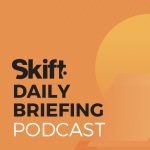Skift Take
Good morning from Skift. It's Monday, January 17, in New York City. Here's what you need to know about the business of travel today.

Skift Daily Briefing Podcast
Listen to the day’s top travel stories in under four minutes every weekday.
Today’s edition of Skift’s daily podcast discusses the bright spot in Delta Air Lines’ earnings report, a new type of holiday for weary workers, and Breeze’s solution to pilot shortages.
Listen
Subscribe
Episode Notes
Here’s what you need to know about the business of travel today.
Some travel executives have said that a little inflation could be good for the industry as it can spark a faster rebound for some sectors. That’s been the case for the hotel industry, which is seeing its recovery boosted by higher room rates, writes Hospitality Reporter Cameron Sperance. Hotel rates in the U.S. are above the national rate of inflation — which is nine percent higher than 2019 — while cruise ships and airlines lag, according to Skift Research. Lodging prices at the end of last year were 12 percent higher than 2019 levels while cruise ship fares only recorded a two percent increase. Meanwhile, airline fares were 17 percent lower in December 2021 than they were in the same month two years ago. The decision by many hotels to charge higher rates has been a big factor in the industry’s recovery. Luxury hotel revenue per available room — its key performance metric — was roughly 16 percent above 2019 levels for the final week of 2021 despite occupancy rates being 14 percent lower, according to industry data company STR.
Next, we look at a unique promotion. Destination Canada has taken steps to encourage frequent flyers from the U.S. to travel to the country. How exactly? It’s paying for many travelers with elite status on U.S. carriers to get matching status on Air Canada, writes Senior Travel Tech Editor Sean O’Neill. The promotion, possibly the first of its kind run by a destination marketing organization, began in late September and stopped accepting new applicants at the end of December. Customers had to book and fly one round trip with Air Canada by January 15, which many did. Participants in the campaign have also been invited to sign up for one-on-one marketing sessions. Destination Canada believes attracting repeat visits from frequent flyers based in the U.S. could boost local economies due to their propensity to spend more per trip and travel for businesses.
We finish today in Taiwan. While the country has recorded low Covid rates, strict measures its government has enacted to prevent Covid’s spread have had a detrimental effect on event organizers, reports Contributor Shawn Cheng for EventMB, a Skift brand. Taiwanese businesses, such as event venues, that largely focus on international travelers have suffered greatly during the pandemic. Sherwood Taipei, one of Taiwan’s most prestigious business hotels, announced recently it was closing after a 32-year run. In addition, trade shows held in the country that typically attracted large crowds pre-Covid have struggled to reach similar attendance figures in 2021. While Cheng writes that it will continue to be a horrible winter for businesses heavily reliant on inbound clients if Taiwan doesn’t ease travel restrictions this year, he believes the country may be well-positioned for a recovery as its robust internet infrastructure will likely make it a destination for organizations looking to host hybrid events in 2022.
Have a confidential tip for Skift? Get in touch



